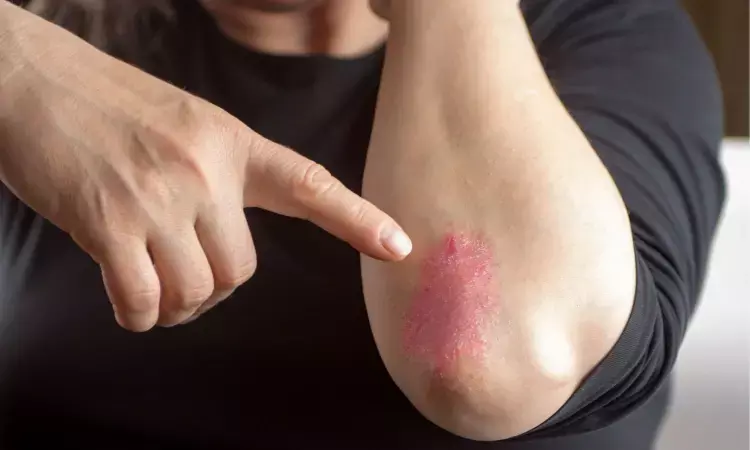- Home
- Medical news & Guidelines
- Anesthesiology
- Cardiology and CTVS
- Critical Care
- Dentistry
- Dermatology
- Diabetes and Endocrinology
- ENT
- Gastroenterology
- Medicine
- Nephrology
- Neurology
- Obstretics-Gynaecology
- Oncology
- Ophthalmology
- Orthopaedics
- Pediatrics-Neonatology
- Psychiatry
- Pulmonology
- Radiology
- Surgery
- Urology
- Laboratory Medicine
- Diet
- Nursing
- Paramedical
- Physiotherapy
- Health news
- Fact Check
- Bone Health Fact Check
- Brain Health Fact Check
- Cancer Related Fact Check
- Child Care Fact Check
- Dental and oral health fact check
- Diabetes and metabolic health fact check
- Diet and Nutrition Fact Check
- Eye and ENT Care Fact Check
- Fitness fact check
- Gut health fact check
- Heart health fact check
- Kidney health fact check
- Medical education fact check
- Men's health fact check
- Respiratory fact check
- Skin and hair care fact check
- Vaccine and Immunization fact check
- Women's health fact check
- AYUSH
- State News
- Andaman and Nicobar Islands
- Andhra Pradesh
- Arunachal Pradesh
- Assam
- Bihar
- Chandigarh
- Chattisgarh
- Dadra and Nagar Haveli
- Daman and Diu
- Delhi
- Goa
- Gujarat
- Haryana
- Himachal Pradesh
- Jammu & Kashmir
- Jharkhand
- Karnataka
- Kerala
- Ladakh
- Lakshadweep
- Madhya Pradesh
- Maharashtra
- Manipur
- Meghalaya
- Mizoram
- Nagaland
- Odisha
- Puducherry
- Punjab
- Rajasthan
- Sikkim
- Tamil Nadu
- Telangana
- Tripura
- Uttar Pradesh
- Uttrakhand
- West Bengal
- Medical Education
- Industry
Systemic antipsoriatic therapy may mitigate CCVD risk in patients with psoriasis

The ORIGINAL ARTICLE "Association between cardio-cerebrovascular disease and systemic antipsoriatic therapy in psoriasis patients using population-based data: A nested case–control study” by Kim et al. is published in the Journal of Dermatology.
In a recent study, researchers have found that systemic antipsoriatic therapy could reduce cardio-cerebrovascular disease (CCVD) development in patients with a history of psoriasis.
There needs to be more data on the effect of antipsoriatic therapy on CCVD. In the present study, researchers performed a population-based nested case–control study to investigate the impact of systemic antipsoriatic therapy on CCVD in patients with psoriasis.
They used nationwide cohort data from the Korean National Health Insurance Claims database. With data, they identified newly diagnosed cases of psoriasis patients. The incidence of CCVD events (ischemic heart disease, myocardial infarction, cerebral infarction, and cerebral haemorrhage) was examined in the enrolled participants after enrollment.
They determined the proportion of the study period during which patients received systemic antipsoriatic therapy. PTP % was the sum of all therapy duration with systemic antipsoriatic drugs divided by the total observation period.
The critical points of the study are:
- In the CCVD group, among 251 813 participants, CCVD events were experienced by 6262 participants.
- Controls included 245 551 patients without CCVD history (non-CCVD group).
- Researchers found greater PTP in the non-CCVD group than in the CCVD group.
- As recorded in multiple logistic regression analysis, PTP was inversely associated with the CCVD risk following adjustment for age, sex, diabetes, hypertension, and dyslipidemia.
- A 10% increase in PTP reduced CCVD risk by 0.96.
- Reduced CCVD risk was robust for both conventional antipsoriatic therapy and biologics.
They said, “In our study, systemic antipsoriatic therapy was inversely associated with CCVD risk in psoriasis patients.”
The study highlighted that systemic antipsoriatic therapy could reduce CCVD development in psoriatic patients.
Further reading:
https://onlinelibrary.wiley.com/doi/full/10.1111/1346-8138.16904
BDS, MDS in Periodontics and Implantology
Dr. Aditi Yadav is a BDS, MDS in Periodontics and Implantology. She has a clinical experience of 5 years as a laser dental surgeon. She also has a Diploma in clinical research and pharmacovigilance and is a Certified data scientist. She is currently working as a content developer in e-health services. Dr. Yadav has a keen interest in Medical Journalism and is actively involved in Medical Research writing.
Dr Kamal Kant Kohli-MBBS, DTCD- a chest specialist with more than 30 years of practice and a flair for writing clinical articles, Dr Kamal Kant Kohli joined Medical Dialogues as a Chief Editor of Medical News. Besides writing articles, as an editor, he proofreads and verifies all the medical content published on Medical Dialogues including those coming from journals, studies,medical conferences,guidelines etc. Email: drkohli@medicaldialogues.in. Contact no. 011-43720751


